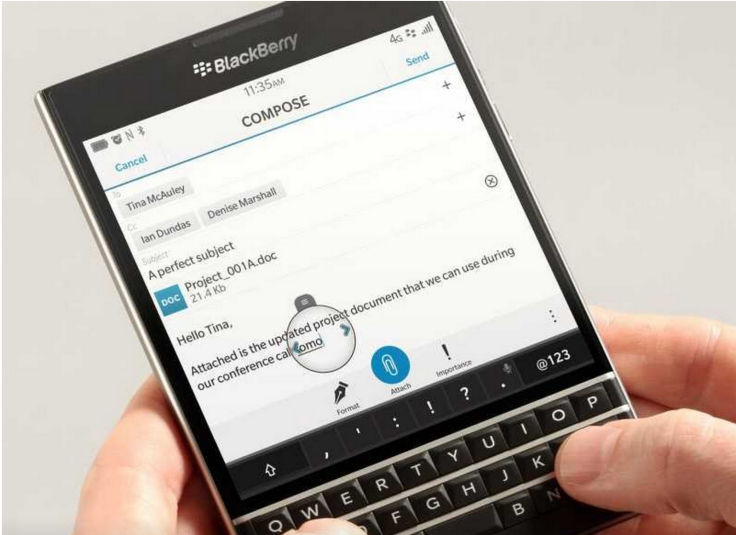Samsung Galaxy Note 4 vs Blackberry Passport Compared: Which High End Smartphone is Better for Productivity?

In recent times, smartphone manufacturers have been trying to woo business users with their new products. Their marketing pitch involves devices that offer great features for those who use their smartphones for productivity.
After it hits store shelves in October, the Samsung Galaxy Note 4 will be one of the most powerful competitors to the new Blackberry Passport. Let's compare the specs of the two smartphones.
Samsung Galaxy Note 4 vs Blackberry Passport Design
The Blackberry Passport is huge: 5.03 inches tall, 3.55 inches wide, and 0.37 inches thick and a little heavy at 194 grams. It is heavier and wider than the Note 4 and might be a little awkward to carry in your pant pockets owing to its squarish form factor. However, its stainless steel frame and matte plastic construction are durable and functional and allow it to feel premium when held.
The Note 4 uses the same shape and form factor that we saw on the Note 3. However, its body has now received a welcome upgrade. The faux-leather back returns, but it feels softer, grippier, and less cheap than the rear of the Note 3. There's also a metal band wrapped around the entire edge of the device. It feels sturdy and more luxurious when compared to Samsung's previous flagship smartphones.
Samsung Galaxy Note 4 vs Blackberry Passport Display
The Blackberry Passport uses a 4.5in IPS LCD display with a resolution of 1440 x 1440 pixels and an excellent pixel density of 453 ppi. It goes without saying that users will have an extremely rich viewing experience.
Recently, the Note 4 was rated by DisplayMate as the best smartphone display to date. It uses a 5.7in Super AMOLED 2K display with a resolution of 1440 x 2560 pixels and a pixel density of 515 ppi.
Samsung Galaxy Note 4 vs Blackberry Passport CPU, GPU, RAM and Memory
The Blackberry Passport houses a slightly older Qualcomm Snapdragon 800 SoC, with a Quad-core 2.26 GHz Krait 400 CPU and a Adreno 330 GPU, along with 3GB of RAM. There's 32GB of on-board memory and an option to expand via microSD up to 64 GB.
The Note 4 houses a brand new Qualcomm Snapdragon 805 SOC with a Quad-core 2.7 GHz Krait 450 CPU and an Adreno 420 GPU, along with 3 GB RAM/ There's 32GB of on-board memory and an option to expand via microSD up to 128 GB.
Samsung Galaxy Note 4 vs Blackberry Passport Camera
The Note 4 uses a solid 16 megapixel camera in the rear with OIS, apart from a 3.7 megapixel camera up front. The rear camera can shoot 4K video and has a list of features including Dual Shot, Simultaneous HD video and image recording, geo-tagging, touch focus, face/smile detection, panorama, HDR and more.
The Blackberry Passport uses a 13 megapixel camera in the rear along with OIS. There's a 2 megapixel camera up front for selfies and video chats.
Samsung Galaxy Note 4 vs Blackberry Passport Battery
Blackberry continues its recent trend of offering smartphones with large batteries. The Passport houses a 3450 mAh battery and should give users at least a day and half of battery life.
The Samsung Galaxy Note 4 uses a 3,220 mAh battery that should offer a day or two of battery life.
Bottomline
If productivity is what you seek, then choosing between these two smartphones might be hard.
Blackberry offers it stellar physical QWERTY keyboard, solid battery backup and its efficient BB 10 OS with solid security features. It has high-end specs, great functionality and is wonderful with emails.
However, the Note 4 has easier access to a plethora of apps given that it is an Android smartphone. It has amazing productivity features thanks to its S-Pen technology and intuitive UI. It has an amazing display, powerful imaging capabilities and much more. Also worth noting is that most of the specs on the Passport were seen on 2013 and 2012 flagship smartphones, while the Note 4 uses the latest and greatest processing components.
If you're keen on Android and prefer the prowess of the S-Pen over a physical keyboard, then Note 4 is the right smartphone for you. However, if you can't do without a phyisical keyboard and prefer Blackberry's approach to smartphone-based productivity, then go with the Passport.
© Copyright IBTimes 2025. All rights reserved.






















